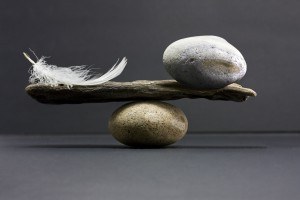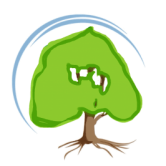
Don’t avoid extremes, and don’t choose any one extreme. Remain available to both the polarities – that is the art, the secret of balancing.
Rajneesh
Lately I have been thinking about balance. Work-life balance has become a popular topic; and at this time of year there is an increased need felt by many for some balance between the hustle and bustle of preparations for holidays and gatherings and the desire to be still and enjoy the calm of the long, quiet nights.
There are other balances, too, that need to be kept in order to make life enjoyable:
- We need a balance between happy and darker moments in order to truly see and enjoy the light and joy of one and to endure the difficulties of the other.
- We need a balance of healthy and plain fun life activities, be it movement or eating or whatever else comes to mind.
- We need a balance between deep and serious engagement and light frivolous enjoyment in our environment.
- We need a balance of material and spiritual comfort and activities.
- We need a balance of listening and speaking, of hearing and being heard.
And there is more that needs to be balanced: our judgements, expectations, desires, fears, worries, and concerns, our hopes, dreams, and wishes, our dedication and our neediness. We live in the balance of all of these things and it is in the way we create these balances that we create our responses to the world, our happiness or misery.
To me the most important of these balances seems to be that of “inside me” and “outside me”. What do I mean by that? Well, one of the main questions arising in my work with people and in my own life are about boundaries:
- Where do I end and the other begin?
- When do I put my needs above those of another? When their’s over mine?
- What is it that makes me so different from them? And is being different wrong?
- How can I live in more harmony with others who are different from me?
And so forth
Boundaries are about balance. Boundaries come up in the places that separate one from the other — and only if there is one and another is there need to balance those two (or more) things. Boundary questions are balance questions; and when our balance is out of whack we notice that first when we notice problems with our boundaries.
These days we can see this when we look at the news: there is a lot of anger showing itself. Anger at “the other”, anger because of injustice. Anger is a sign that boundaries have been violated — and apparently there have been boundaries violated for a long time without that being spoken. Now it is being yelled at the world and so we all suddenly realize that there is something seriously out of balance in our world.
What does all that have to do with “inside me” and “outside me”?
Each one of us is a part of this world. We were born into it, it has shaped us and protected us, challenged us and bruised us. our awareness of who we are is almost entirely dependent on the world around us. We see ourselves by seeing our actions, words, and thoughts mirrored in the world. When we look at the way in which all life is connected in any Eco-system, we have acknowledge that we, too, are part of a system, that our life, our person, our Self is integral and important to that system at the same time that it is but a tiny and minute piece within it.
On the other hand, the world is as it is at least partly because of our actions. What we do and how we think impacts the things and people around us, now and for generations to come. There are traditional stories about that: the butterfly wing in Asia that sets in motion events that result in a storm in the Americas; a tree planted in the 1800s that saves a man’s life in the 1900s when he climbs it to get away from danger. We don’t know how our actions impact the future — ours and that of generations to come. We can’t always know — and we can’t stop living our lives for fear of what might be.
But we can — and we need to — strive for balance
By balance, in this case, I mean mindfulness, honesty, respect. In order to create balance between “inside me” and “outside me” I first need to be honest with myself.
When we look at the world and we see things out there that create strong emotional reactions in us, what do these events mirror back to us? As we are watching all the hate that currently is being spewed out about people of other races and genders, what remnants of this live in us? How do we — probably unknowingly, maybe even with good intent — behave racist or sexist at times? Are there any such thoughts in us that go undetected? Or are we feeling the pain of the victims of this hatred? Are we feeling weak, unimportant, in danger? If so, what is it that we are afraid of? What old wounds need to be attended to in order to reclaim our inner truth and power? This is a difficult inner examination. Our first reaction usually is defensiveness: “I don’t have anything of that in me.” Maybe not; and yet, if we are afraid to look — maybe, we do after all.
If we can get through this difficult inner examination, our hearts and souls can rejoice. We can become clearer about our inner truth, about who we really are. If we are really honest about that, we can shine the light on any darkness we find and change it. By doing that, we grow and heal a part of our soul — and a bit of the soul of the world. This is the “inside me” part of the the scales of balance.
When our soul is healed and we find the inner courage to face our own demons, we can be in the world differently, act differently. Maybe we won’t turn away when we see cruelty or injustice. Maybe we will be able to listen with more respect to what those with another perspective need to say. Maybe we find the courage to apologize and make amends for the hurt that we inflicted — actively or by denying that it existed. Or maybe we just will see another person a bit deeper, a bit clearer, a bit more for who they really are. As we do so, the world can begin to heal, to become whole again — and in becoming whole again it can offer our own souls a deeper refuge, a better and more connected home. This is the “outside me” part of the scales of balance.
Humankind has not woven the web of life. We are but one thread within it. Whatever we do to the web, we do to ourselves. All things are bound together. All things connect. Chief Seattle
It is December.
We stand at the end of a year, at a balance point of light on the day of the winter solstice, at the balance point of time at New Year’s Eve. This year it seems we are also at the balance point of eras. What was is beginning to fade and what is to come is not yet visible. We may have worries, fears, hopes, or dreams about the future, longing or anger about the past; but none of this is of the Now.
Right now, in this moment in time, at this turning point in the year, when earth and sun are still moving further away from each other, what is it in each of us that is separated, too far away, laying in the dark, hiding, not seen? What can we see in the world that we need to heal in ourselves? What can we do differently in the world so that we can create deeper wholeness and connection within ourselves? What is it that lives in our hearts and souls that needs our love and care and attention so that we can bring it forward, healed and more whole than ever for the healing of the world around us? What is living in us that wants to be born into new light when earth and sun finally decide to change their course and move closer together again?
There is much promise in times like these. It feels like everything is possible: the good, the bad, and the ugly. Yes, that can be frightening: we all like the safety of knowing what to expect. But it is in times like this that we have the best chance to create real, lasting change — inside ourselves and in the world. There are some things that are required for such change to happen: inner and outer preparation; honesty within ourselves and courage to speak the truth in the world; the willingness and ability to truly listen to anyone without fear, without judgement; and the ability to accept things as they are without allowing them to defeat us. Not an easy task, but if we listen to our soul’s voices, we know that we will be able to live up to it.
We must become bigger than we have been: more courageous, greater in spirit, larger in outlook. We must become members of a new race, overcoming petty prejudice, owing our ultimate allegiance not to nations but to our fellow men within the human community. Haile Selassie

